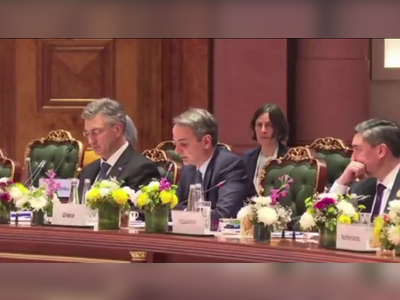How Germany's Bureaucracy Clogs Public Response to Coronavirus
WHEN A PLANE arrived in the German city of Hamburg from Milan in late February, some of the passengers onboard were wearing medical face masks because the potentially deadly novel coronavirus had already started to spread in northern Italy. Airport authorities in Hamburg said they wanted to check on the health of those disembarking and ask them about their travel plans.
Obtaining detailed information from people coming from coronavirus danger zones had previously been suggested by the Federal Ministry of Health in Berlin. But the passengers from Milan simply disembarked and left.
Why? Because there was no legal requirement for passengers to fill in forms about their health, an airport doctor explained. It's the responsibility of the Hamburg health authorities, not Berlin, another spokesperson said.
The episode illustrates how countries' bureaucracies can facilitate or impede a rapid response to a public health emergency. Granting greater authority to Germany's federal government to coordinate a response to public health emergencies is now a subject of urgent public debate as the virus surges across Europe. Germany has more than 1,600 cases and three deaths, but at a March 11 news conference Chancellor Angela Merkel said that up to 70% of Germans may eventually become infected with the virus that can cause the COVID-19 diseas
Other European countries are taking aggressive steps to lessen the impact of the virus. The Italian government has placed the whole country on lockdown and Austria will shutter universities and other educational institutions next week. It is also considering closing schools and kindergartens and has closed its border with Italy. Austria also forbade any indoor events that draw more than 100 people, while the French government is ruling out events with more than a 1,000 attendees.
This week, Merkel and her federal health minister, Jens Spahn, said banning large events is a good idea, but the federal government did not institute an official ban. They couldn't: A special German law, the Protection against Infection Act, regulates responsibilities in a health crisis and stipulates that decisions are up to state-based health authorities, not the central government. The German government's thinking behind the law is that health departments in Germany's 16 states understand their communities best. The federal health minister and other senior politicians may only offer advice and coordinate their efforts.
The system has its benefits, says Kordula Schulz-Asche, the Greens political political party spokesperson for social policies, including health care. Medical experts at the Robert Koch Institute, the federal agency responsible for disease control and prevention, are supposed to give politicians advice, Schulz-Asche says. "The federal structure is one of the country's strengths because it means that there are more resources available."
But that structure is also proving confusing, as the incident at Hamburg airport demonstrates. It also means decisions may depend on individual politicians' opinions. "Above all, I advise everyone to keep a cool head and not to over-exaggerate," Berlin's interior minister, Andreas Geisel, told journalists this week after criticizing Spahn. "We've all had the flu before."
Spahn and others, meanwhile, have said that, after this crisis is over, they want to reconsider the Protection Against Infection Act and potentially increase the central government's powers when it comes to confronting a public health emergency.
"Federalism is no help here," German politician Karl Lauterbach, also a professor of the health economics, said on German television. "States, the federal government and municipalities must come together and – in my opinion – must agree on one, single set of rules. The way it's going now won't suffice … when the number of cases rises."
In a statement, the Federal Association of Physicians of German Public Health Departments said, "in the current situation, it is cooperation that should be of the highest priority, not looking for somebody to blame."
For now though, the confusion continues. After Spahn's recommendation, the states of Bavaria, Bremen and Thuringia halted events with more than 1,000 participants because, as one local politician noted, attending a soccer game is now a life or death decision. Bavaria also forbade operas, theater and concerts. Other German states are considering similar moves.
Until Wednesday morning, some larger cultural events in Berlin had been cancelled but other events, such as a major soccer game this weekend that would likely draw 22,000 spectators, was still going ahead. It was only after a heated debate between state politicians mid-week that it was decided the game should be played without spectators and that Berlin should join other states in cancelling larger events. Meanwhile, in the city of Mannheim, a classical music concert came in for criticism because it went ahead with 999 attending, just under the 1,000-person limit.
In some states, schools are closed and students quarantined. In others, it's business as usual. And because the federal government hasn't forbidden travel, some organizations are still going ahead with planned meetings and workshops; the lack of travel warnings or bans by the central government means costs may not be refunded.
The country's problem with bureaucracy goes beyond differences in federal and regional decision-making. In January this year, the German physicians' union, the Marburger Bund, reported that most doctors have to spend three hours or more a day on paperwork.
"The immense load of bureaucracy in German hospitals still exists, even under current conditions," says a spokesperson for the German Hospitals Federation, the DKG. "It is very problematic. We would like to see this change but as far as we know no significant measures have been introduced."
What the outbreak of the coronavirus has changed in Germany is the federal government's suspension of the rules governing the minimum number of personnel working in the hospital at any one time. This allows hospitals to be more flexible with their rosters and do away with the related paperwork, says the DKG spokesperson. "But," the spokesperson adds, "that's just a small part of the total bureaucracy in a hospital."














